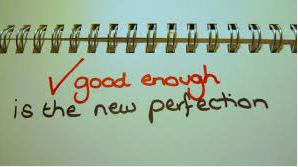When Good Enough Is Really Good Enough
Our world continues to change at breakneck speed, and consequently, people in the workforce need to keep pace with current expectations, standards and technologies. They also need to rethink their job descriptions and titles when those become as outdated as last week’s breaking news. The purpose of this post is not to incite debate about which things need to be edited. The point is to illustrate how a change in mind-set will help some people get more done and help others identify new ways to apply their skills by better understanding current employment trends.
For example, editing has a different connotation than it used to for many of us. Perfect doesn’t exist, and slightly less than perfect may be just fine. As with most things in life, there are times when precision in communication is vital to relaying accurate messaging, and there are times it is not. In some cases, good enough is really good enough.
Texting is probably the most obvious example. Proper spelling is no longer a requirement. The only real requirement is that the message is conveyed in a way that the intent is received accurately. The reason behind this acceptable form of communication is clear: it takes less time to type a letter that sounds like a word, or a symbol that represents a word, than it takes to type the whole word. Simply put, “R u :)?” is an acceptable and understandable replacement for “Are you happy?” This is an obvious change to anyone who currently uses a hand-held device to communicate. For others who see the abbreviations used to communicate on these devices as an outward deterioration in the quality of written communication, the reasons for adopting these changes may not be as obvious.
With the speed that technology allows us to change messaging, data and manufactured products, the need to be as precise or exact about some details no longer exists. In today’s world, the time used to make major edits to a lengthy product description may be wasted if the product itself has changed two or three times by the time the first description gets completed. Many times, people have limited time to review data and may be looking at overviews and concepts, rather than reading word for word.
Someone who has previously found work as an “editor” for technical documents may be finding there are fewer and fewer opportunities. More people are now responsible for proofing and editing information inside of the larger scope of their work. Additionally, when Web content is involved, a “producer” or “project coordinator” may actually be the person who is tasked with ensuring accuracy of published information. What this means to prior “editors” is that they can be on the lookout for work that has a job description with a different title.
For others who may find that they spend an inordinate amount of time reworking and reworking documents without any change in the overall value, some guidelines could be used for determining when “good enough” will do. If you find yourself reworking your resume so many times it is keeping you from actually meeting people to talk about potential opportunities to get work, or if you have spent extra hours on projects but have not been paid for the added effort, or if you don’t understand why companies are allowing “good enough” to prevail, then hopefully this information will help.
Sometimes reworking and reworking can cause deadlines to be missed, budgets to be blown or opportunities to pass. The following are some points I’ve learned to ask when reviewing documents that are needed quickly. If you answer yes to items 1-8, then please go back and give it another shot. Otherwise, if the answer to 1-8 is no, then please give yourself a break and move on.
- Are there typos or obvious errors?
- Will the intent of the message change?
- Will more work increase the value or change a perception?
- Will there be any misunderstandings if left the way it is?
- Will someone get sick or die?
- Is the work public?
- Are you cutting back on profits by overworking the product?
- Will leaving it “as is” defame you, your client or anyone else?
- Have the goals of the project been met?
- In a year, who will know or care?







Great advice, especially to check if “the intent of the message is clear.” Folks sometimes type so quickly that you receive a text and have no idea what it means. It is a waste of time if you have to ask “what”? This problem can be made worse by “Suri” or other automatic helpers and non-sense texts or emails are sent. This could be a make or break if you are communicating with an potential employer.
As a communications professional, I’ve worked in a variety of employment situations and learned that it seems “everyone is an editor.” No matter how perfect you may strive to make your copy, there will always be a suggestion or recommendation on how to improve it. So following the points recommended above is good advice, in my opinion.
Great questions! Good reminders. Made me smile, too. 🙂 (“Will someone get sick or die?”)